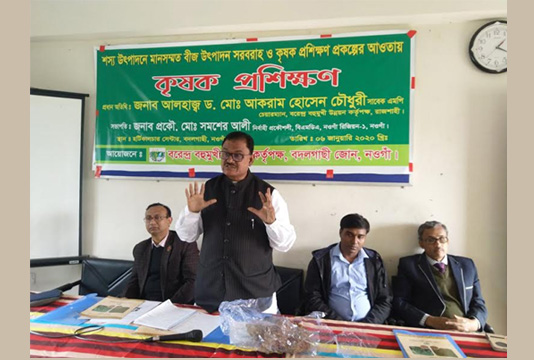RAJSHAHI, Jan 6, 2020 (BSS) – Emphasis should be given to the promotion of less-irrigation consuming cereal crops instead of depending on only Irri-Boro farming in Barind area to lessen the gradually mounting pressure on underground water, said Dr Akram Hossain Chowdhury, chairman of Barind Multipurpose Development Authority (BMDA).
He viewed that large-scale promotion of less-water consuming crops could
be an effective means of mitigating the condition of water crisis in the
drought-prone Barind area.
Dr Chowdhury referred to various research findings and mentioned that
there are enormous scopes of increasing the acreage of various low-water
consuming crops like wheat, black gram, sesame, lentil, maize and pulse in
the high Barind tract.
He was addressing a daylong farmers training titled “Seed Production,
Processing and Cultivation of various crops” held at BMDA office training
room in Badalgachhi Upazila of Naogaon today as chief guest.
BMDA’s project titled ‘Quality Seed Production, Distribution and Farmers
Training for Crops Production’ organized the training where farmers from
different areas attended.
With BMDA Executive Engineer Shamsher Ali in the chair, Director of the
project ATM Rafiqul Islam, Principal Scientific Officer of Regional Wheat
Research Station Dr Ilias Hossain and BMDA Assistant Engineer Harunur Rashid
also spoke.
The meeting was told that wheat could be cultivated on seven to eight
bighas of land with same amount of irrigation-water needed to irrigate one
bigha of Boro rice through soil moisture utilization and the best uses of
modern technologies.
Wheat plays an important role in ensuring food security as its
consumption is increasing day by day.
Dr Akram Chowdhury said that BMDA has a significant contribution toward
making the Barind area a multiple cropping zone at present instead of single
one through providing irrigation.
But time has come to reduce the farming of Irri-Boro paddy through
promoting the less-water consuming wheat, maize, pulses, oilseeds and spices.
“We have to change the mandate of BMDA”, he added.
All the authorities concerned and farmers should come forward and work
together to this end. Farmers in the hard Barind area need time-befitting
training and motivation on how to cultivate more water-saving crops to lessen
the exorbitant pressure on groundwater.
Dr Chowdhury viewed there is no alternative to encourage the farmers to
promote various cereal crops and vegetables instead of only Irri-Boro paddy
on the dried land to face the water stress condition.



